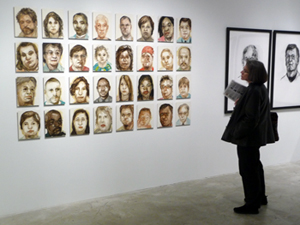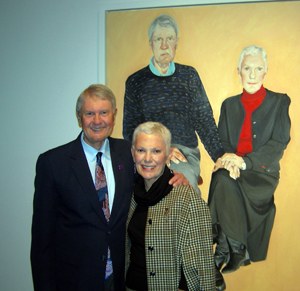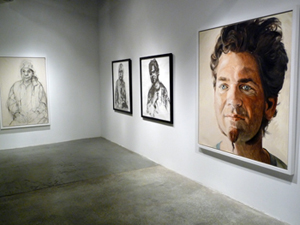 |
Joanne Sowell from the art history department at UNO checks out some of Mark Gilbert’s portraits on opening night. |
 |
Rob and Mardi Denell in front of their portrait done by artist Mark Gilbert. |
 |
Some of the portraits done by Mark Gilbert. |
Ten years ago, Mardi was diagnosed with breast cancer. In 2001, Rob was diagnosed with a nasal pharangeal cancer on the left side of his face above the oral cavity.
The Denells, who live in Manhattan, Kan., and both work for Kansas State University, had no idea where to go for treatment of Rob’s somewhat rare form of cancer.
They researched head and neck cancer specialists and found three institutions that stood out — M.D. Anderson Cancer Center in Houston, Memorial Sloan-Kettering Cancer Center in New York City, and The Nebraska Medical Center.
Given the proximity of Manhattan to Omaha (about 140 miles), they decided to first check out The Nebraska Medical Center. It wound up being the only place they went.
The Denells were instantaneously wowed by the medical center and the expertise of the head and neck surgery team. Rob’s physician was Bill Lydiatt, M.D., professor in the UNMC Otolaryngology – Head and Neck Surgery Department.
“The care here is unbelievable. But, it’s more than that — it’s the whole environment at the medical center,” said Mardi Denell, who worked for many years in a genetics laboratory at Kansas State. “We’ve never seen anything like it. It’s the most beneficial environment you could possibly have.
“It’s not just the team providing our health care. It’s the receptionist working the front desk at the Lied Transplant Center as well as the housekeeping staff and the cafeteria employees. We couldn’t be more pleased. We brought lots of Christmas gifts with us this year.”
This year’s visit to UNMC was extra special. During their frequent visits to UNMC, the Denells had been invited by Dr. Lydiatt to sit for a portrait with Scottish artist Mark Gilbert, who was working on a unique art exhibition depicting patients and caregivers.
The exhibition, “Portraits of Care: Here I Am and Nowhere Else,” was the brain child of Dr. Lydiatt and Virginia Aita, Ph.D., associate professor in the College of Public Health. They are using the exhibition to conduct research on how art can be used to enhance people’s understanding of health, illness and caregiving.
The Denells came to Omaha for both the kickoff reception at the Joslyn Art Museum on Dec. 11 and the opening of the exhibition at the Bemis Center for Contemporary Arts the next day.
They both spoke with great feeling about what the portrait experience meant to them.
“For patients, there’s a feeling of what do you do next after treatment,” said Rob Denell, who is director of the Johnson Center for Basic Cancer Research at Kansas State. “Sitting for the portrait was another step into wellness. It was part of the continuum`… a nice little bridge.”
“I call it the ‘Power of the Brush,'” Mardi Denell said. “When everything else was spinning around us, sitting for the portrait was like a cocoon. It gave us security. It becomes a new part of your identity as you go forward.”
More than 200 people attended the opening reception, including University of Nebraska President James B. Milliken and his wife, Nana Smith.
They listened to remarks by Drs. Lydiatt and Aita as well as Gilbert and Mark Masuoka, executive director of the Bemis Center. Ted Kooser, former U.S. poet laureate and Pulitzer Prize winner, delivered the keynote address.
|
|
He said he wrote more than 130 poems during the winter that he was undergoing treatment.
“My cancer experience was filled with anger, depression and chaos,” Kooser said. “Cancer is a thing without order. Writing gave me order.”
During his radiation treatments, Kooser would walk down the road outside his rural home near Garland, Neb., pick up a stone, then bring it back to the house and put it on a ledge. It was his way of keeping track of his treatments.
Gilbert talked about the uniqueness of the project. “It was an immense privilege for me to work with patients who let me do their portraits during the most vulnerable times of their lives,” he said.
“Events like this give me a moment of pause,” Masuoka said. “This project has taken the Bemis Center pretty firmly out of our comfort zone.”
More than 450 people attended the opening night at the Bemis Center — nearly double the normal turnout at the Bemis Center, which is at 724 S. 12th St.
The exhibition, which includes more than 40 portraits, will run through Feb. 21. It also will feature three presentations at the Bemis Center related to the project.
These presentations, which are free and open to the public, include:
- Jan. 15, 7 p.m. — Presentation by patients and caregivers involved in the project with discussion involving the audience.
- Jan. 29, 7 p.m. — Presentation by Carl Greiner, M.D., UNMC professor of psychiatry, on the psychological implications of the project along with discussion involving the audience.
- Feb. 12, 7 p.m. — Panel discussion with Gilbert, Masuoka and Hesse McGraw, curator of the Bemis Center.
A catalogue containing all the portraits as well as essays written by many of the key people involved in the project is available for $30. Proceeds from the sale of the catalogues will go toward a research fund for the UNMC College of Public Health, the UNMC Department of Otolaryngology – Head and Neck Surgery, and the Bemis Center. For more information on the catalogues, call Dr. Aita at 559-5157.